
Vol. 1, No. 32 Published by India China Division, Air Transport Command August 23, 1945
|
First Troops To Land Expected To Be Airborne On the eve of the occupation of their homeland, the Japs have given warning that there may be sporadic outbursts from non-conforming military groups when the first U.S. airborne forces land near Tokyo Sunday. The Japanese government and Imperial headquarters, in a joint communiqu quoted by the Army News Service, stated Tuesday that the first occupation forces will land at Atsugi airfield, 20 miles southwest of Tokyo. After the airborne landings on Sunday, further landings from warships and transports will take place Tuesday in the Yokosuka area, the Jap ministry stated. Yokosuka is one of Japan's largest naval bases, located at the mouth of Tokyo Bay. Transfer Troops Domei, Jap news agency, quoted the ministry as saying that the Japanese Army and Navy forces would be "transferred immediately" from the landing area to prevent any outbreaks. Sufficient police will be stationed in the occupation areas to "maintain peace and order." The Japanese announcements were the first disclosures of the plans for the triumphal entry by Allied forces which will lead to the formal surrender to Gen. MacArthur as Supreme Allied Commander. MacArthur had announced only that the occupation would be carried out by the end of the month. Envoys Co-operate Method for keeping the Japanese people under control when the American forces land will be left to the Japanese themselves, according to an Allied spokesman. Planes carrying atomic bombs will accompany the "invaders." During the preliminary conferences at Manila on Monday, the Japanese mission made a favorable impression on MacArthur's men. "We are convinced that the Japanese envoys are sincere and honest," a spokesman said. "They gave us all the information and co-operated in every way." MacArthur did not meet the mission at Manila. Formal surrender terms were expected to be signed in Japan some time next week. |
|
Ghost Ship Gets Signals from 1333, Lands Elsewhere 1333 BU, Chabua, Assam - A plane was returning from China one night recently when this field was closed in by heavy fog. The pilot called the tower. "Request landing instructions - ship is affirmative!" The tower operator scanned the skies with his field glasses. "Landing northeast, blink your landing lights, please." "They're blinking!" came the voice from the plane. "We can't see you!" "We're on final approach. Give us a green light!" Again the tower operator searched the skies and saw nothing. He was trying to contact the plane when he heard the mystifying report from its pilot, "Where do I park her?" The tower operator was frantic. "We didn't see you pass the tower." "I'm on the steel mat in front of you!" If this were some pilot's prank. it was time to become indignant. "No plane has passed the tower and none is parked on the steel mat!" At another base several miles away, another tower operator was trying desperately to contact a strange plane which approached its runway without landing instructions and parked in front of the tower on the steel mat. |
Report Clashes Between Chiang's, Communist Troops
Chungking - While Premier T. V. Soong was conferring with Allied governments elsewhere, officials here became more and more alarmed over reported clashes between the Kuomintang government and the s0-called Chinese Soviet in Yenan.
The Associated Press relayed reports from "usually reliable" sources here, that Chinese central government troops have clashed with communist forces near Taiyuan in Shanai province, 250 miles southwest of Peking. The communists are said to have seized an airfield and then to have been ejected by central government troops.
Troops Massing?
At the same time reports indicated that from 20,000 to 30,000 Chinese communists were massing to attack the Yangtse port of Wuhu in order to strike 55 miles down the river to Nanking, China's prewar capital.
Monday, the Japanese news agency reported that Soviet, Mongolian and Chinese communist forces have linked up and are massing to attack Jap-held Kalgan, 100 miles northwest of Peking.
The agency added: "In spite of Japanese efforts to stop hostilities, the Soviet air force has been bombing the city for two days, and powerful tank and infantry forces have been massed in what appears to be a plan to capture Kalgan before Chungking troops reach the area."
Wants Conference
Gen. Chu Teh, commander of the Chinese Communist 18th Group Army, cabled the Generalissimo demanding the participation of representatives of the liberated areas in the acceptance of the Japanese surrender and in the peace conference formation of a coalition government and political reforms.
Meanwhile Premier Soong conferred in Britain and the United States. At Witt, England, he talked with the Chinese ambassador to London, instructing him to impress upon Britain the urgency of the situation in China.
Diplomatic circles in London reported that the Chinese government is requesting the United States and Britain to urge Russia to bring pressure on Chinese communists in order to avoid grave danger of civil war in China.
Later, in Washington, Dr. Soong met Pres. Truman and Secretary of State James Byrnes.
In New York, Madame Chiang Kai-shek stated that she hopes and prays the communists "will put national interests above party interests and let wisdom prevail to avoid civil war."
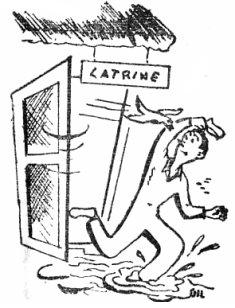
|
1302 BU, New Delhi - The India wing public relations office got the bird and put in for a Purple Heart in the same operation this week.
An enlisted man, sent to cover AAF Day, rushed into the "gentlemen's lounge," a small wooden building which some genius planted in the weediest, muddiest spot in Assam.
Just as he opened the door, out came one of the local birds, taking off hot from the rear of the structure. The feathered one banked sharply, but too late, and crashed head-on into the chest of the public relations man. The GI was unhurt because of a strategically placed copy of Frenchy Frolics in his upper left pocket. However, for once he was knocked speechless. Looking down at the winged one, which seemed to have come out second in the impromptu battle, the GI remembered his Boy Scout training. He reached down to give first aid.
Suddenly the feathers fluttered to life and, like a helicopter, the bird took off straight for the GI's face.
Back into the sunlight our hero stumbled, fingering the scratches on his face. Covering the war in the Valley can be rough - with all those secret weapons.
Non-Critical MOS Men with 85 Points To Head for Home
Hq., Calcutta - Prospects were bright Wednesday for the immediate return to Uncle Sugar, for discharge from the service, of 300 ICD GIs with 85 points and non-critical MOSs. An equally large group of others will leave shortly.
This announcement was made by Col. James I. Teague, assistant chief of staff, personnel, who said those being released immediately have MOS numbers not regarded as critical by the War Department or ICD.
Men in the second group, the bulk of them radio operators, always scarce in the division, also have 85 points, but they must await replacement before release. However, Hq., ATC, has promised an immediate move to start the replacements on the way, and it shouldn't take too long.
|
Helicopters Deliver Patients
To China General Hospital
Hq., SOS, Kunming - Helicopters are delivering injured victims of airplane crashes to within 70 yards of the receiving office of the hospital here.
After a helicopter circles the hospital three times, the receiving office dispatches an ambulance and a medical officer to a stretch of roadway less than 70 yards away. The patient is unloaded from the helicopter and driven to a hospital ward.
Smoother Going
The helicopters deliver cases in urgent need of treatment to the hospital within two or three hours after they are picked up.
Almost important as speed is the fact that certain types of injury might be aggravated by riding over rough roads in the area. Explained Col. Furman H. Tyner, CO of the general hospital, "Even the trip from nearby airfields in an ambulance might be sufficient to cause further complications to an already serious injury."
Fly Direct
When a crash is reported, helicopters of the 14th Air Force search and rescue squadron comb the terrain of Yunnan province. Alighting near a wreck, they fly the crew members or passengers in need of immediate treatment directly to the hospital.
The "animated eggbeater" have been operating this special delivery service to the hospital for the past few months.
EM Discharge Age Cut to 38, Speeding U.S. Demobilization
Washington (ANS) - The Army last week lowered to 38 the age at which enlisted men may be discharged as one step in the effort to demobilize 5,000,000 men within 12 months. The 38-year-old group will be eligible for discharge within 90 days after they ask for release, War Sec. Stimson said.
The discharge point minimums of 85 for enlisted men and 44 for WACs remain unchanged for the time being, but the Army promised they would be reduced gradually, after it had been made certain that the Japanese have accepted the surrender terms in good faith.
"There are two and a quarter million trained Japanese soldiers in the home islands alone and an equal number still to be disarmed in other Pacific and Asiatic territory," Stimson said.
|
Says CG of China
Hump Cargo Credited With China's Survival By General
Hq., Calcutta - "The United Nations are proud of the contribution made by the Air Transport Command to the final defeat of Japan," stated Lt. Gen. A. C. Wedemeyer, commanding general, China Theater, in a wire to Lt. Gen. Harold L. George, CG, ATC, and Brig. Gen. Tunner.
"Among your congratulations and praise, none will be more heartfelt and sincere than those which I tender you on behalf of all the Chinese and Americans in China," Gen. Wedemeyer continued.
Of ICD, Wedemeyer said:
"Upon their cargoes (ICD planes) China as a nation survived for three years when there was no other contact with the world. Your fliers made the Hump the most famous mountain range in the universe. Over these lofty and jagged ridges ATC lifted the gasoline, arms, bullets, bombs and other materials that made it possible for China to carry on the fight. A salute to your pilots, to your flying crews and to your ground personnel."
Along the same theme, Gen. George credited the personnel of ATC with an "accomplishment that has brought a new meaning to air power and a new era to aviation. This achievement belongs to everyone in this command," the general added.
Said Gen. H. H. Arnold:
"At this moment of final victory I extend congratulations to your command (ATC) for the far-reaching contributions you have made in bridging the endless miles separating our forces throughout the world. Your untiring effort and unselfish devotion to duty have been essential factors in the final collapse of our enemy."
'Jeeps' Land at 1360 After Re-Outfitting
L-5s Invited Jap Rifleman To Take 'Pot Shot' in Burma
1360 BU, China - Arrival of a new plane is always an exciting event here, and when a flock of L-5s landed recently, base personnel turned out en masse to view the maneuverable ships, little-known here, and to talk with the crews.
The control tower operator was the first to see what looked like a swarm of bees in the distance. The planes might well have been bees, judging from the height at which they were flying. In a formation rivaled only by the P-47s over Germany, the "grasshoppers" skirted the control tower, and one by one peeled off and landed. Where one transport parks, 12 of these L-5s fitted easily.
Jungle Jeeps
The crews piled out, and the CO, Capt. D. J. Eyer, of Lancaster, Pa., told the men here something of the organization. Officially a liaison squadron, among themselves they are the "Jungle Jeeps." Officers are rated military pilots, and enlisted men, liaison pilots. All are trained technicians.
For nine months these puddle-jumpers worked at their job in the battle for Burma. Flying low over enemy lines to direct artillery fire, they invited even the Jap rifleman to take a "pot shot." Their job also included evacuation of the wounded to rear line hospitals.
Evacuation, according to the crew, was one of their easiest jobs, a task for which the little grasshoppers are particularly suited because of their size and maneuverability. A field only a few hundred feet square, a road, any cleared section served as a loading station. One badly-wounded GI was removed from the battlefield in a small fraction of the time it would have taken over ruined roads.
Across the Hump
When questioned about bringing the jeeps from Burma, the men smiled as they recalled the trip over the Hump. The "terrific Rockpile," which has been a Waterloo for many bigger planes, proved little trouble for the sturdy L-5s. The men laughingly recalled the time all the planes were lost in a single canyon surrounded by rugged, cloud-covered mountains. They milled around for almost an hour until one tiny craft found a way out.
When the campaign in Burma was successfully completed, the group went across the Hump, where they spent several weeks in re-outfitting. From here their destination was secret. But as the crew climbed back into their smooth little "Jungle Jeeps," personnel here had no doubts concerning the outcome of their next mission.
Navy Trick Fools Japs
Third and Fifth Fleets Are Same; Only Admirals Different
Washington (ANS) - Now that the shooting is over, it can be revealed that the U.S. Third and Fifth Fleets were, for all practical purposes, the same, changing numbers as two admirals alternated in command.
When Adm. William F. Halsey bossed the fleet, it was the Third and when Adm. Raymond Spruance and his staff took over, it became the Fifth.
The two-name system was devised to keep the Japs worrying over the location of the Fifth Fleet when the Third Fleet was in action and vice-versa.
A fast carrier task force was the central striking element of the fleet and here again the Navy pulled a double. In Halsey's Third Fleet it was Vice Adm. John McCain's Task Force 38 and when Spruance commanded, it was Task Force 58 under Vice Adm. Marc A. Mitscher.
Twice as Many Lives Lost in Second War as in World War I
Washington (ANS) - Nearly twice as many American fighting men gave their lives in World War II as were killed in World War I, latest Army and Navy casualty figures indicate.
Killed in nearly four years of this war were 251,717 Americans. In the last war 126,000 men were killed or died.
Overall casualties this time were nearly triple those of World War I when 364,000 were listed. This war's total was 1,069,218. The Pacific war alone was estimated to have cost the U.S. 300,000 casualties or about one tenth of the estimated Japanese casualties.
|
STAY 'WAY . . .
The barracks of Hostel 4 at Kunming are situated just off the end of the runway. Every time a plane takes off, or needs an extra surge of power on the final approach, it sounds as if it were going to take the roof off the building. This is more uncomfortable than somewhat to the boys that live there by the grace of the WASC and the Number One Boy.
One of the boys got a little tired of jumping under the bed or running out of the door every time a plane came tearing down on final approach. He tacked the following notice on the door of his room:
"In the past, certain airplanes have been coming through here on their approach. This practice will cease. If you have a plane with you, don't use this lounge - go around!"
According to the last report, he's still to be found under the bed or behind the water barrel several times a night and more than that when bad visibility makes real low approaches necessary.
ATOMS 'N ANGUISH . . .
Remember when, long before we got into this mess, we used to sit back, sip a cool drink and chuckle over the fantastic ideas that appeared in Astounding Magazine, Amazing Stories and that kind of rag? We used to laugh at the jerks that dressed them up, used to think their stuff was plain drivel and that they were smoking some kind of weed that made them nuts. Maybe they were smarter than we realized.
This atomic bomb is quite a deal. When it exploded over that ill-fated town in Japan, it might just as well have exploded in every home in the world. In some way or other, every person in the so-called civilized parts of the world will be affected by this release of previously unrealized energy. To try to imagine that a single 500-pound bomb could do as much damage, cause as much death and destruction as s fleet of heavy bombers - one junior size bomb - almost makes a guy stagger as if he were on a vodka drunk.
But it doesn't really stun, this thinking about the terrifying force that has been released, until one realizes that there are so many ways in which this atomic abortion might have been used and may be used in the future.
If they ever can harness this force to a plane, or a train, or a dynamo or any piece of machinery, there will be no further worry about running out of fuel. And when they get to the point where they can efficiently propel aircraft by atomic power, aerodynamics, as we know it now, might just as well be tossed out the window. Planes might take on the shape and size of ocean liners, or even houses - complete with front porch - and fly away.
When that time comes, armies might be moved by single planes, victory through air transport support power might well be feasible, and the loudspeaker at the Burbank air terminal might blare forth... "Flight Z09, United, leaving at Gate 5 for Mars, Jupiter and Venus."
It's possible.
Then on the other hand, if this demon of death is ever grabbed off by the wrong party, the world is sunk. What could Hitler have done to England if he had only had the power of this secret? What toll would the Japanese balloon bombs have taken on the west coast of the U.S. if the explosive attached had been an atomic bomb instead of anti-personnel or incendiary? And, can they use the same type of explosive on battleships, in long range artillery guns, in submarine torpedoes?
All this leads to these questions: "What should the U.S. do with the secret? How should it be handled? Should it be given to the other nations with the hope that they will never use it against us? Or should it be hoarded, guarded in a vault somewhere, held as a protection against future wars?" These are the many, many things that exploded with the houses, horses and hopes in that Jap city when a B-29 dropped the first, but not the final, atomic bomb.
|
Policing of Strip Cut to Minimum with New Magnet
1306 BU, Karachi - A locally built electro-magnet, mounted on the front of a portable field-lighting unit from which it gets its power, has resulted in cleaner and safer runways and ramp areas as an aid in rubber conservation at this base.
When the circular brush used to clean the aircraft and vehicle areas was found insufficient, Sgt. Rogers, Cincinnati, Ohio, in charge of the drive here, set base engineers to work constructing the magnet. Until it was completed, the sergeant and ten coolies policed the areas daily to cut down on damage to rubber tires.
With the magnet now operating efficiently, a sharp decline in punctures and flat tires is already noticeable. Sgt. Rogers still employs several coolies to pick up metal and stones not affected by the magnet.
Shifts in Command of Wings Reported
Hq., Calcutta - Shifts of wing and forward echelon command were announced this week. Brig. Gen. C. W. Lawrence was named Assam wing commander, replacing Col. George D. Campbell, who became CO of the China wing. The latter succeeded Col. Richard F. Bromiley, who has been assigned as commander of forward echelon. Col. F. M. Coates, replaced by Col. Bromiley, will return to division headquarters.
|
Rats Chew Clothes, Books, Have Cannibalistic Instincts, Too
(Ed. - This is the second in a series of articles about China, contributed by various Chinese writers.)
By Li Shih-kuel
The terror in every home of Chungking and Kunming, rich or poor, the terror that disturbs the people day and night, and the terror that makes people lose their temper, ready to fight and finally laugh in nondescript misery, is caused by rats. There are no less than 3,000,000 rats in each city.
Rats eat people's food before or after the person's daily meals. If a housewife keeps her food so carefully as to keep away the rats, the rats usually take revenge by biting her favorite clothes or even precious books and manuscripts.
Informed Circles
Aside from eating people's food, rats take peanut shells, clothes, buttons, wooden seals, candles, leather shoes, table legs, letters, toothbrushes and everything else. It seems the rats are born to do nothing but eat. They are people's hygiene superintendents. If people's clothes are carelessly spattered with drops of oil or peanuts are left in the pockets, holes probably will be made by rats in the unclean parts of their clothes.
Rats are informed circles. Whenever any new building is established, rats move into the building without delay. One rat steals eggs for a bowl, holding the egg with all four legs, and then another rat will grab its tail and pull it off to their holes. Some people claim that the rat is one of the cleverest animals.
Bed to Bed
The reason rats make our hair stand on end is not so much that they are unceasingly biting our things, but that they are cannibals.
Rats travel from bed to bed when people sleep. In a college five girls were bitten on the face by rats and the blame was laid to using too much fragrant powder.
"I prepare delicious paste every night to feed the rats in my house. rats won't take anything else in my room, as they are satisfied with my paste," says Chan Tsin-Chi Kand, middle-aged school teacher, with a smile.
General Credits Personnel with One of Big War Jobs
Hq., Calcutta - Personnel of the command was credited with a share in "one of the most difficult and important assignments of this war," in a statement this week by Brig. Gen. Tunner.
On completion of almost a year as ICD commander, the general told officers and men they had shared a mission in mass air transportation "the like of which the world had never seen." Alluding to the surrender of Japan, he asserted:
"From a small monthly tonnage at the outset, which certainly would have had but little effect on our Japanese enemies, cargo to China has increased steadily . . It has gathered momentum . . until the mass of tonnage delivered proved beyond all doubt that not only air forces but whole armies could be supplied in China - and were, to the distress and destruction of our enemies."
He pointed out millions of Americans left their homes and risked their lives to win the war. Among these, he declared, those serving with ICD "have turned in one of the finest performances." He added:
"You have lived on the outskirts of civilization with primitive surroundings, in areas infested with disease. You have often been afflicted with the monsoon, the steaming heat and other discomforts of the Orient. Yet your performance was so fine that it brought the highest recognition and praise from our comrades and from all Allied quarters throughout the world."
|
1303 BU, Agra, India - Indians formed a quiet and curious audience for a simple but impressive ceremony in which Cpl. Lyle A. Hatley and Pfc. Vernon G. Best became citizens of the United States.
Hatley was born in New Zealand and Best was a Canadian citizen. The ceremony was conducted by Robert C. Hill, American vice consul, who had flown from Calcutta. S/Sgt. Sam Parker and Capt. Benjamin Caron, 1303 BU, were official witnesses.
The soldiers went through the simple rites that made them American citizens under an American flag flying over the marble benches fronting the Taj Mahal.
Regulation Gives 'Malum'
On Departure from ICD
Hq., Calcutta - If you had any idea of taking opium, heads of wild birds, live insects, lottery tickets, counterfeit coins or liquor candy home when you leave - forget it. You won't be allowed to do it.
Those prohibitions and many others are contained in ICD regulation 35-7, just released, which sets forth procedures for air and water shipment of personnel to the States.
Items which can't be taken from the Theater run the gamut from the "strange" ones mentioned to Air Corps equipment such as flying clothing and watches, ordnance materials such as grenades, and signal property like radar parts. No one is allowed to leave with more than 100 cigars and one gallon of wine or liquor.
Pointing out a majority of men transferred to the U.S. by air will be moved as "Green project" passengers, the regulation indicates those going to or from the States on TDY, civilians, foreign nationals and medical evacuees will travel as "normal passenger traffic."
Baggage of those passengers will be limited to 65 pounds for officers and 35 for GIs, and to two pieces - a field or musette bag and a B-4 or duffle bag. Excess baggage will be forwarded for water shipment.
Final inspections of baggage will be made at the 1306 BU, Karachi, where material not passable will be confiscated. Letters, documents, photos, exposed or unexposed film, diaries and unaddressed communications must be censored at Karachi also. Details of medical requirements are listed, too - down to the certificate of freedom from vermin and communicable diseases and an up-to-date immunization record.
Those who have been hoarding GI clothing may be distressed to learn of the "complete showdown" inspection at 1306. Government property in excess of that on the prescribed list (in ICD Reg. Form 35-7C) will be withdrawn. And don't forget your dogtags - you'll need them, as well as medical records, travel orders, pay records, qualification cards and a host of other documentary evidence that you're ready to soar homeward.
Victory Show Tops Calcutta Celebrating
Hq., Calcutta - Crowds jammed Monsoon Square Garden Sunday and Monday nights as a star-studded victory show climaxed Calcutta's celebration of the war's end.
Sponsored by Brig. Gen. Robert R. Neyland, CG, Base Section 2, SOS, the show turned away 5,000 people Sunday night and a repeat performance was staged Monday.
Talent was picked from SOS, ATC and EPU. A blast from an Army Service Forces band started the show.
Cast of the production included:
Marion Moore, Leon Fields, emcees; Tony Martin, Leonard Bergantina, singers; "Honey" Coles, tap dancer; Leonard Pennario, Harold Woodall, pianists; Bob Roberts, baton twirler; Al Parsons, acrobatic dancer; Miss Ana Buckley, vocalist; EPU "Harem Holiday;" Jive Bombers, Syncopaters, Commanders, Mountaineers with Larry Clinton, dance music; "Jubilee," Negro rhythm group; EM colored chorus spirituals, and Dan Tobin, dedication.
Name Forged, Officials Say
Letter-to-Editor is Phony; Halperin Cleared of Authorship
Hq., Calcutta - Authorship of a letter-to-the-editor, signed "Pfc. Jim Halperin," which was published in the June 28 issue of the Express, and which, because of its criticism of the Army rank system, has caused considerable comment from other readers, has been denied by Pfc. Jim Halperin, of 1342 BU.
The letter's signature has been branded as an outright forgery by China wing officials who have investigated the matter. They have advised the Express that the soldier who forged Halperin's name has been identified and that legal proceedings have been initiated against him. He could be given a maximum sentence of five years in a federal penitentiary for the offense.
The Express published the letter in good faith, despite its highly controversial subject matter. Pfc. Halperin has declared, according to China wing officials, that the letter has caused him much embarrassment and that his character has been defamed.
|

The Halperin Case
In the June 28 issue of the Express a letter, signed "Pfc. Jim Halperin, 1342 BU," was published in the "Mailbag" column.
This letter, which criticized "rank-happy" officers, alleged that "This is a beautiful war for generals on down to captains" and said, "We poor GIs have to suffer," caused much comment among readers. It was answered pro and con.
The Express, which is the voice of the ICD GI, as well as the officer and the command, published the letter in good faith although it did have the earmarks of having been written by a chronic griper who was generally sore at the Army and everything in it.
Now the letter has been proved a forgery. Pfc. Halperin has denied authorship of the letter and China wing officials have informed us that the soldier who forged Halperin's name has been identified, and that legal proceedings have been instigated against him. He faces a possible sentence of as much as five years in a federal penitentiary for forgery, under AW 96, if the "book" is thrown at him.
More serious to the Express, perhaps, is that Pfc. Halperin has suffered a grievous injustice at the hands of a fellow soldier. China wing reports that Halperin has suffered embarrassment over the incident, as he was severely criticized in some letters which took issue with the original letter, and that, as a result, his character as a soldier has been defamed.
To Pfc. Halperin, the Express extends sincere regrets and makes amends in the only possible way - by printing the facts and clearing up the matter. The Express holds nothing but contempt for the man who forged Halperin's name.
The "Mailbag" column is one of the most important departments of the paper. It is the only medium in which ICD soldiers may exchange ideas, express their opinions on current topics - from USO shows to grand opera, from war-strikes to the Brooklyn Dodgers - and blow off steam over their "gripes."
It is a column which can obtain worthwhile accomplishments, if given a chance. It is a means of facilitating discussions on myriad subjects by individuals who perhaps never would meet in person and whose opinions otherwise might never reach each other. It is also a method of achieving more tangible goals, to bring to light things which can - and should - be corrected.
Letters to the editor in ICD assume a significance which many missives to civilian newspapers back home do not have. It is generally considered the act of a "crackpot" to communicate with the editor of a metropolitan daily in the States, although people who write to small weeklies usually have the same feeling as the majority of those who write to the Express. They see something which impels them to have their say, in an effort to improve the situation for everyone concerned.
The Express affords an opportunity to officers and men of the command to say things in print which they perhaps would not get a chance to say to the right person individually. Some few may abuse this privilege, but it is believed that the majority will treat it as any other privilege!
As far as "gripes" go, it would be well if letter-writers devoted themselves to specific things rather than to generalizations, if they are sincere in their desire to encourage remedial action. Continual criticism of the Army, harping upon the time-worn "rank" distinction between officers and enlisted men, doesn't do anyone any good, in the long run. It is an operational necessity to have rank in an organization and certainly in a military organization during time of war.
Letters founded upon specific facts - food, living conditions, recreational facilities, etc. - can have a tremendous effect. The Express forwards such letters to sections involved, and readers can be assured that if those sections find something is wrong, which can be corrected, they try to rectify it. There are many examples of such results in the files.
On the other hand, if letters prove "phonies," the Express and all the people it represents are penalized. We become handicapped because such misrepresentation of fact weakens future cases, as sincere as they may be. It's so easy to say, "Oh, that's just another guy popping off."
We want letters from readers. But we don't want "phonies" - and it isn't smart to sign another man's name to anything!
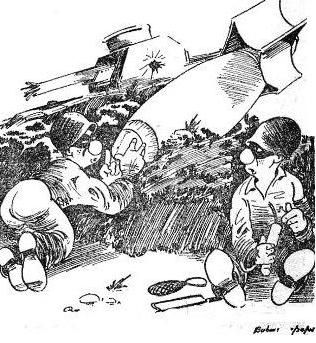 "S-sh!"
"S-sh!"
|

|
ATOMICS
A Phewlitzer Award apiece to those who debate whether a weapon is "humane" or not. Once you've determined to kill a man - a more grievous affair, in most societies, than arson, embezzlement, or rape - it becomes a rather academic question whether you (a) slap a slug between his eyes, (b) smash his home, family and person, or (c) level and sear his capital, country and countryside. A military instrument is not a humane instrument.
One can imagine a solemn government-issue "discussion group" of long ago: "Resolved, that crossbows are cruel and must be outlawed."
If this new power found on earth is to be called a "weapon," let's posthumously indict those who invented the wheel and the lever, for they invented a pair of sinister weapons. Devices are made into weapons not by human hands but by subhuman minds, to whom travesty is truth, truth duty, that is all they know . . .
What has happened now is that humanity is given a sublime opportunity to herd up all the world's militarists, strip them of playthings, pretensions, and tacky baubles, and put them to work. (In many cases it might have to be simple work, but there will always be need of that.) Then all the earth's navies and other machines of ruin might be gathered at a particular island and by one atomic gesture be effaced - though not, unhappily, forgotten. Finally, the race of men could begin to plan for itself.
And that certainly is now its only salvation, though many will doubtless share the view expressed by Shaw this week that such a race scarcely seems to deserve any salvation.
ATOMICOLLINS
One colleague reports that at Bar Mets Grill, the groggery at his khaki khampus, the local admixture of lemon soda and lethal gin, formerly called the Consolidated Liver-aerator, is now sold as an Atomicollins.
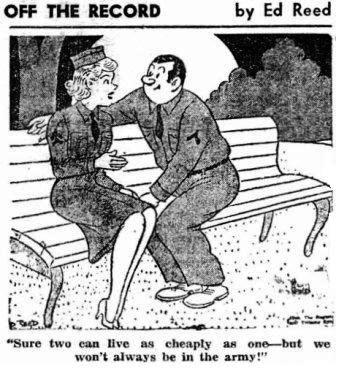
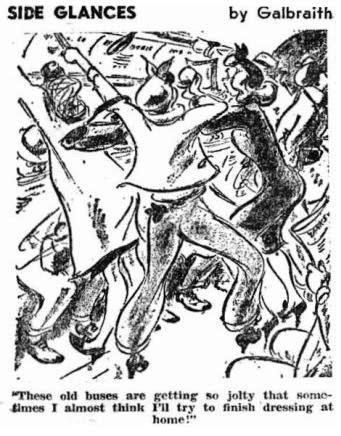
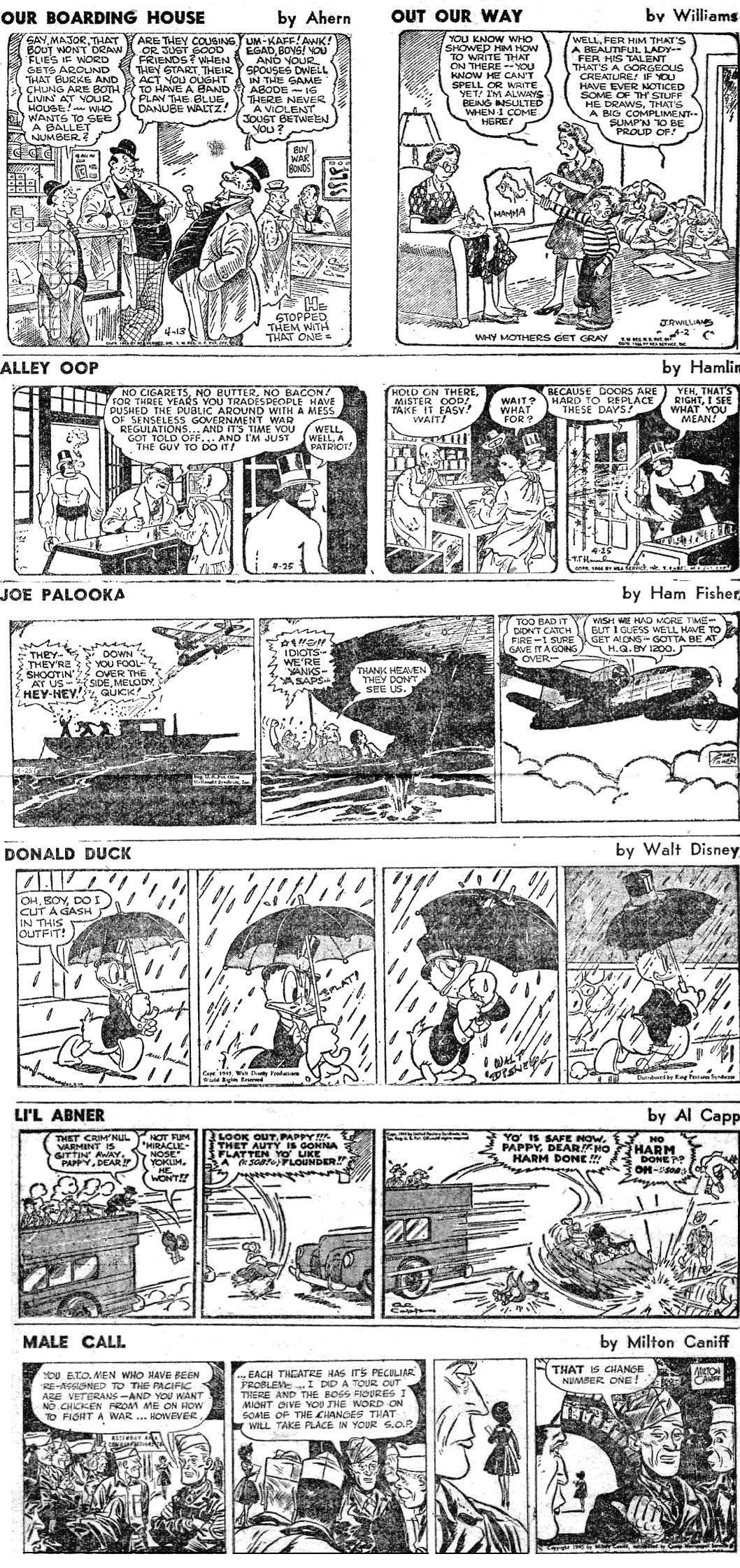
|
|
Serves as Vacation Spot
At the ATC's newest rest camp in Bombay it's not the open country and the marvels of nature that lend appeal but rather the mental stimulation which can come from life in a large city.
This newest rest camp, Deepak Mahal, is a five-story hotel on the ocean front in greater Bombay. Deepak Mahal has all the conveniences found in U.S. hotels and is a little self-sufficient community.
Those who have been there say the place has everything. They list them in the order of their importance: women, wine and placed to go.
Capt. Lewis V. Fuchs, CO of the camp, was a seaman second class in the last war and has the GI slant, and with it, all the answers. The captain can't get the dates for GIs but he knows his way around and can tell people where the girls are to be found. "And," he says, "there are plenty!"
The wine situation also is reported good. There is an excellent bar in the hotel where there is ample scotch, rum, rye and gin. There are two cocktail lounges for private parties.
Bombay offers plenty of entertainment. There are any number of the swimming pools and beaches, theaters, hotels, bars, grills and night clubs.
Deepak Mahal features excellent service. There are many bearers, and the laundry and cleaning service is good. There is a large dining room through which an ocean breeze is always blowing. The army has installed a well-stocked post exchange.
The men report no exhilarating mountain air, no stimulated appetites and no spectacular scenery, just a lot of city noise, places to go and things to do.
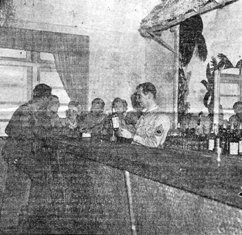
|
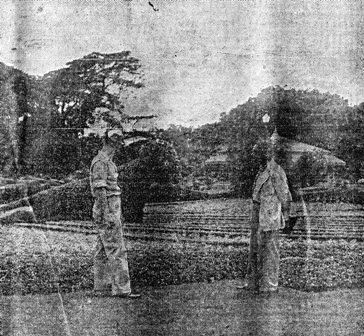
|
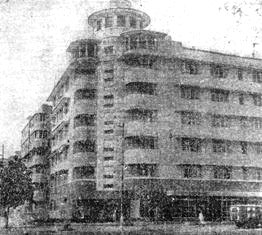
|
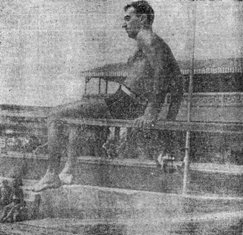
|
GIs Handle Food Supply For Chinese
Many of Chiang's Troops Receive Rations in East
Chanyi, China - Through the hard work of 11 American soldiers of Ration Purchasing Commission No. 2, thousands of Chinese troops for the last two months have received food supplies, to aid in the push in the East.
Battling a scarcity of food and transportation and working with non-standard Chinese weighing devices were the big problems the American GIs faced in their new job. When the problem of food supply was handed them, these combat veterans of the SOS base here immediately called meetings of local magistrates and merchants in eastern Yunnan and explained the shortage of rations for Chinese soldiers in the field.
|
"We said we had plenty of Chinese currency in our possession and that we wanted to exchange it for tons of meat and vegetables," S/Sgt. John Belt, Cincinnati, Ohio, recalled. The sergeant explained that when it was stressed that the progress of the Chinese armies in the East depended on getting food quickly, the merchants were eager to co-operate.
The Chinese then combed the area for food to sell the American soldiers. But finding food was not the only problem, since local weighing machines were not standardized, transportation was rarely available, and it was difficult to lease the few warehouses in the province.
"Eventually everything was straightened out and we managed to feed thousands of Chinese troops," Sgt. Belt stated. "Now the warehouses are stocked and we have turned the food supply task over to Chinese buyers we've trained."
Trip Insurance Is Now Offered ATC Travelers
Hq., Calcutta - Military and civilian passengers traveling on ATC aircraft now may purchase at any station in the division, trip insurance offering coverage from ten days up to a year.
A $2,500 policy for ten days costs $2.50, and the maximum $10,000 policy for the same period, $10. Maximum protection for a year can be bought for $90. Policies also are sold covering a period of one month, two months and six months.
When a policy id bought, the purchaser is covered on any trip made with ATC. The beneficiary receives the lump sum of the policy, with disability payment for loss of limb and eyesight also provided. Flight crews are not covered.
Applications are available at all personal affairs offices in the division. The insurer is the Indemnity Co. of North America, Philadelphia, Pa.
Victory Telegram Service Now Open To Forces in India
Hq., Calcutta - Lucky GIs who want to wire home "I'll be seeing you soon" may do so now with the release of "victory letter telegrams" for use by all military personnel in India and authorized U.S. civilians.
At present, this service is available only from and to the United States and Alaska.
VLTs will be handled in the same manner as SCMs (sender's composition messages) with unit or base censorship required. After the wires are censored, they may be filed personally by the sender or passed in batches to the telegraph office.
Cost of the
|
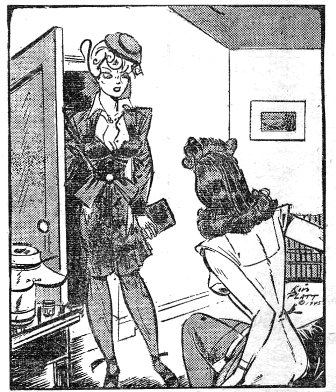 "And he told me he'd been sent home for combat fatigue!"
"And he told me he'd been sent home for combat fatigue!"
|
Messages will contain only personal matter, with the letters "VLT" written at the beginning of the address and charged for as one word. There is no guaranteed time of transmission or delivery.
NYC to Karachi Is New TWA Run
Hq., Calcutta - Priorities and Traffic announced that beginning soon, Trans-continental and Western airlines will operate one trip daily from Washington to Karachi.
The airline will be operating under contract with ATC and will haul whatever the Army needs, although it is expected that mostly passengers will be flown to and from Karachi by the civilian pilots.
Itinerary on the route includes Washington, New York, Stephenville, Santa Maria (Azores), Casablanca, Tripoli, Cairo, Abadan and Karachi. Return trip will be over the same route.
HUMP EXPRESS is the official newspaper of the India-China Division, Air Transport Command, APO 192, c/o Postmaster, New York, N.Y., and is published by its Public Relations office. Camp Newspaper Service and Army Newspaper Service features are used, reproduction of which is prohibited without permission of CNS and ANS, 205 East 42nd St., New York, 17, N.Y. Other material is submitted by staff members, ICD-ATC base Public Relations sections and other soldier correspondents. Printed weekly by the Hindusthan Standard, 3 Burman St., Calcutta, India, and distributed each Thursday. Passed by U.S. Press Censor for mailing.
| Military transport schedules over India for cargo, personnel and mail . . . maximum tonnage of essential war materials over the Hump . . . movement of troops and supplies in support of tactical operations in China . . . evacuation of the sick and wounded - these are the missions of ICD-ATC. |

AUGUST 23, 1945
Original issue of HUMP EXPRESS shared by CBI veteran Grover P. Fike
Copyright © 2008 Carl Warren Weidenburner
TOP OF PAGE PRINT THIS PAGE ABOUT THIS PAGE E-MAIL YOUR COMMENTS
PREVIOUS ISSUE HUMP EXPRESS BASE NEXT ISSUE
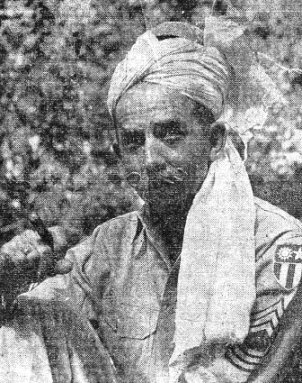 1306 BU, Karachi - It isn't the "colonel" from the cover of Esquire but a facsimile. It's M/Sgt. Von Painter
Black who is stationed here. Twenty-five months' service in India explains the presence of the turban. When Black wore
his moustache straight across his face it measured 11 inches from tip to tip.
1306 BU, Karachi - It isn't the "colonel" from the cover of Esquire but a facsimile. It's M/Sgt. Von Painter
Black who is stationed here. Twenty-five months' service in India explains the presence of the turban. When Black wore
his moustache straight across his face it measured 11 inches from tip to tip.
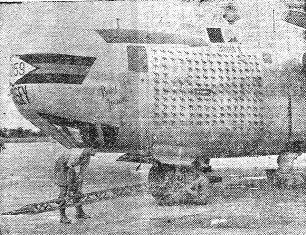 "Baby Joanna," already a Hump-hopping veteran, as indicated by the camels on its side, id shown here just after
being towed to the ready-line for another haul over the Rockpile. S/Sgt. Augustine Digneo, left, and Sgt. Richard
Rinelli, center, remove the towbar, while Cpl. Salvatore Vallarie checks bomb-bay tanks for leaks.
"Baby Joanna," already a Hump-hopping veteran, as indicated by the camels on its side, id shown here just after
being towed to the ready-line for another haul over the Rockpile. S/Sgt. Augustine Digneo, left, and Sgt. Richard
Rinelli, center, remove the towbar, while Cpl. Salvatore Vallarie checks bomb-bay tanks for leaks.
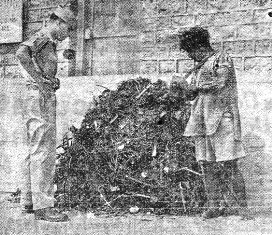 1306 BU, Karachi - Sgt. Rogers, Cincinnati, Ohio, in charge of rubber conservation, looks over a ten-day haul of nails, screws and scrap
iron - 800 pounds of it - picked up from runways and ramp areas here. An electro-magnet, built by base engineers,
helped pick up the debris.
1306 BU, Karachi - Sgt. Rogers, Cincinnati, Ohio, in charge of rubber conservation, looks over a ten-day haul of nails, screws and scrap
iron - 800 pounds of it - picked up from runways and ramp areas here. An electro-magnet, built by base engineers,
helped pick up the debris.
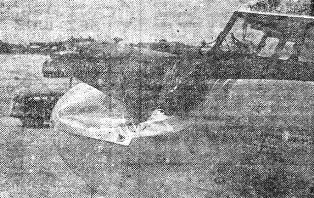
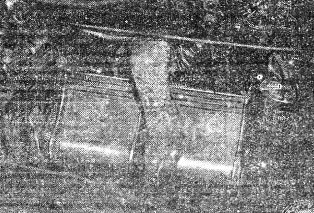 Whether the war is on or off doesn't make much difference to the vultures of India. The top picture shows the
wings and body of the creature outside a C-47 after a mid-air collision at 7,000 feet over Dum Dum, India. The lower
picture shows how the dive-bomber went straight through the plane's metal skin, his neck and head dangling almost
to the control pedals. The crew escaped injury.
Whether the war is on or off doesn't make much difference to the vultures of India. The top picture shows the
wings and body of the creature outside a C-47 after a mid-air collision at 7,000 feet over Dum Dum, India. The lower
picture shows how the dive-bomber went straight through the plane's metal skin, his neck and head dangling almost
to the control pedals. The crew escaped injury.
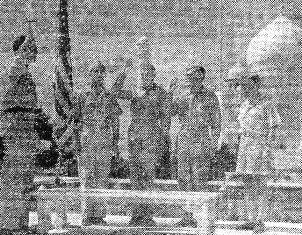 New Zealand-born Cpl. Lyle A. Hatley and Pfc. Vernon G. Best, formerly of Canada, raise their right hands and take
the oath making them U.S. citizens. The ceremony was conducted by Mr. Robert C. Hill (left) and witnessed by S/Sgt.
Sam Parker and Capt. Benjamin Caron, 1303 BU.
New Zealand-born Cpl. Lyle A. Hatley and Pfc. Vernon G. Best, formerly of Canada, raise their right hands and take
the oath making them U.S. citizens. The ceremony was conducted by Mr. Robert C. Hill (left) and witnessed by S/Sgt.
Sam Parker and Capt. Benjamin Caron, 1303 BU.
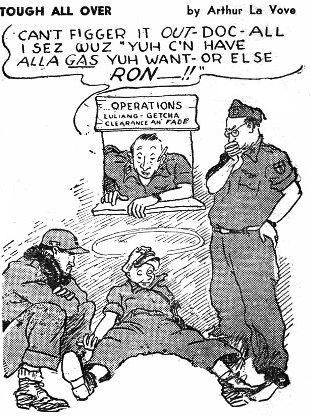
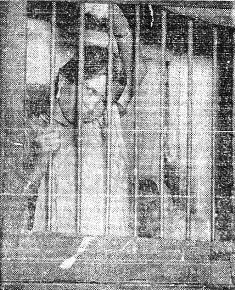
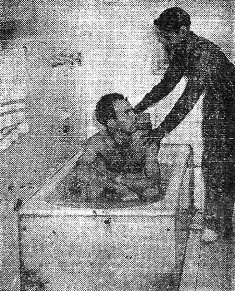
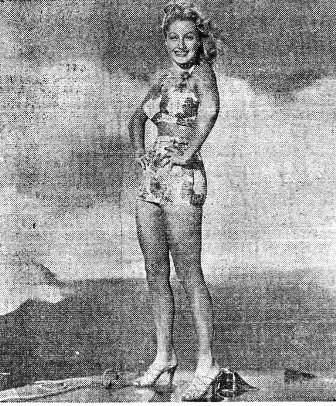 Diana Lewis does a fine job of posing on a fine, high-powered motor launch. Reconversion should bring more
of both.
Diana Lewis does a fine job of posing on a fine, high-powered motor launch. Reconversion should bring more
of both.